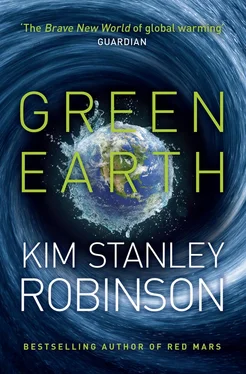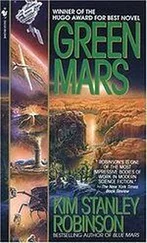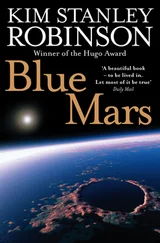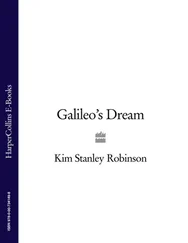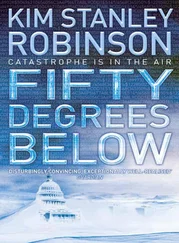The Arctic Ocean ice pack reflects back out to space a few percent of the total annual solar energy budget. When the Arctic ice pack was first measured by nuclear submarines in the 1950s, it averaged thirty feet thick in midwinter. By the end of the century it was down to fifteen. Then one August the ice broke up into large tabular bergs, drifting on the currents, colliding and separating, leaving broad lanes of water open to the continuous polar summer sunlight. The next year the breakup started in July, and at times more than half the surface of the Arctic Ocean was open water. The third year, the breakup began in May.
That was last year.
Weekdays always begin the same. The alarm goes off and you are startled out of dreams that you immediately forget. Predawn light in a dim room. Stagger into a hot shower and try to wake up all the way. Feel the scalding hot water on the back of your neck. Fragment of a dream, you were deep in some problem set now escaping you, just as you tried to escape it in the dream. Duck down the halls of memory—gone. Dreams don’t want to be remembered.
Evaluate the night’s sleep: not so good. Anna Quibler was exhausted already. Joe had cried twice, and though it was Charlie who had gotten up to reassure him, as part of conveying to Joe that Mom would never again visit him at night, Anna had of course woken up too, and vaguely heard Charlie’s reassurances: “Hey. Joe. What’s up. Go back to sleep, buddy, nothing gets to happen until morning, this is pointless this wailing, good night damn it.”
After that she had tossed and turned, trying not to think of work. In general Anna’s thoughts had a tropism toward work. Last night had been no different.
Shower over, she dried and dressed in three minutes. Downstairs she filled a lunch box for her older boy, same as always, as required: peanut butter sandwich, five carrots, apple, chocolate milk, yogurt, roll of lunch meat, cheese stick, cookie. As she got the coldpack out of the freezer she saw the neat rows of plastic bottles full of her frozen milk, there for Charlie to thaw and feed to Joe during the day. That reminded her—not that she would have forgotten much longer, given how full her breasts felt—that she had to nurse the bairn before she left. She clumped back upstairs and lifted Joe out of his crib, sat on the couch beside it. “Hey love, time for some sleepy nurses.”
Joe glommed on to her while still almost entirely asleep. With his eyes closed he looked like an angel. He was getting bigger but she could still cradle him in her arms and watch him curl into her like a new infant. Closer to two than one now, and a regular bruiser, a wild man who wearied her; but not now. The warm sensation of being suckled put her body back to sleep, but a part of her mind was already at work, and so she kept to the schedule, detached him and shifted him around to the other breast for four more minutes. When they were done he would go back to sleep and snooze happily until about nine, Charlie said.
She hefted him back into his crib, buttoned up and kissed all her boys lightly on the head. Charlie mumbled “Call me, be careful.” Then she was down the stairs and out the door, her big work bag over her shoulder.
The cool air on her face woke her fully for the first time that day. It was May now but the mornings still had a bit of chill to them, a delicious sensation given the humid heat to come. Truck traffic roared south. Splashes of sunlight struck the blue sheen of the windows on the skyscrapers up at Bethesda Metro.
Anna passed the Metro elevator kiosk to extend her walk by fifty yards, then turned and clumped down the stairs to the bus stop. Then down the escalator into the dimness of the great tube of ribbed concrete. Card on turnstile, thwack as the triangular barriers disappeared, down the escalator to the tracks. No train there, none coming immediately, so she sat down on a concrete bench, opened her tablet, and began to study one of the jackets, as they still called them: the grant proposals that the National Science Foundation received at a rate of fifty thousand a year. “Algorithmic Analysis of Palindromic Codons as Predictors of a Gene’s Protein Expression.” The proposal’s algorithm had shown some success in predicting which proteins any given gene sequence would express. As genes expressed a huge variety of proteins by unknown ways, this would be very useful. Anna was dubious, but genomics was not her field. It would be one to give to Frank Vanderwal. She noted it as such and queued it in a forward to him.
The arrival of a train, the getting on and finding of a seat, the change of trains at Metro Center, the getting off at the Ballston stop in Arlington, Virginia: all were actions accomplished without conscious thought, as she read proposals. The first one still struck her as the most interesting of the morning’s bunch. She would be interested to hear what Frank made of it.
Coming out of a Metro station is the same everywhere: up a long escalator, toward an oval of gray sky and the heat of the day. Emerge abruptly into a busy urban scene.
The Ballston stop’s distinction was that the escalator topped out in a vestibule leading to the glass doors of a building. Anna entered this building, went to the open-walled shop selling pastries and sandwiches, and bought a lunch to eat later at her desk. Then she went back out to Starbucks.
This particular Starbucks was graced by a staff maniacally devoted to speed and precision. Anna loved to see it; she liked efficiency anywhere she found it, and more so as she grew older. That a group of young people could turn what was potentially a very boring job into a kind of strenuous athletic performance struck her as admirable. Now it cheered her again to move rapidly forward in the long queue, and see the woman at the computer spot her when she was two back in line and call out to her teammates, “Tall latte half-caf, nonfat, no foam!” and then, when Anna got to the front of the line, ask her if she wanted anything else today. It was easy to smile as she shook her head.
Then outside again and around to the NSF building. Inside she showed her badge to security, went to the elevators.
Anna liked the NSF building’s interior. The structure was hollow, featuring a gigantic central atrium, an octagonal space that extended from floor to skylight, twelve stories above. This empty space, as big as some buildings, was walled by the interior windows of all the NSF offices. Its upper part was occupied by a large hanging mobile, made of curved metal bars painted in primary colors. The ground floor was occupied by various small businesses facing the atrium—pizza place, hairstylist, travel agency, bank outlet.
A disturbance caught Anna’s eye. Across the atrium there was a flurry of maroon, a flash of brass, and then a resonant low chord sounded, filling the big space with a vibrating blaaa, as if the atrium itself were a kind of huge horn.
A bunch of Tibetans, it looked like: men and women wearing belted maroon robes and yellow winged caps. Some played long straight horns, others thumped drums or swung censers, dispensing clouds of sandalwood smoke. They crossed the atrium chanting and swirling, all in majestic slow motion.
They headed for the travel agency, and for a second Anna wondered if they had come to book a flight home. But then she saw that the travel agency’s windows were empty. In the doorway the Tibetanesque performers were now massing, in a crescendo of chant and brassy brass, the incredibly low notes vibrating the air. In the midst of the celebrants stood an old man, his brown face a maze of deep wrinkles. He smiled, raised his right hand, and the music came to a ragged end in a hyperbass note that fluttered Anna’s stomach.
The old man stepped free of the group and bowed to the four directions. He dipped his chin and sang, his voice splitting into two notes, with a resonant head tone distinctly audible over the clear bass, all very surprising coming out of such a slight man. Singing thus, he walked to the doorway of the travel agency and touched the doorjambs on each side, exclaiming something sharp each time.
Читать дальше
